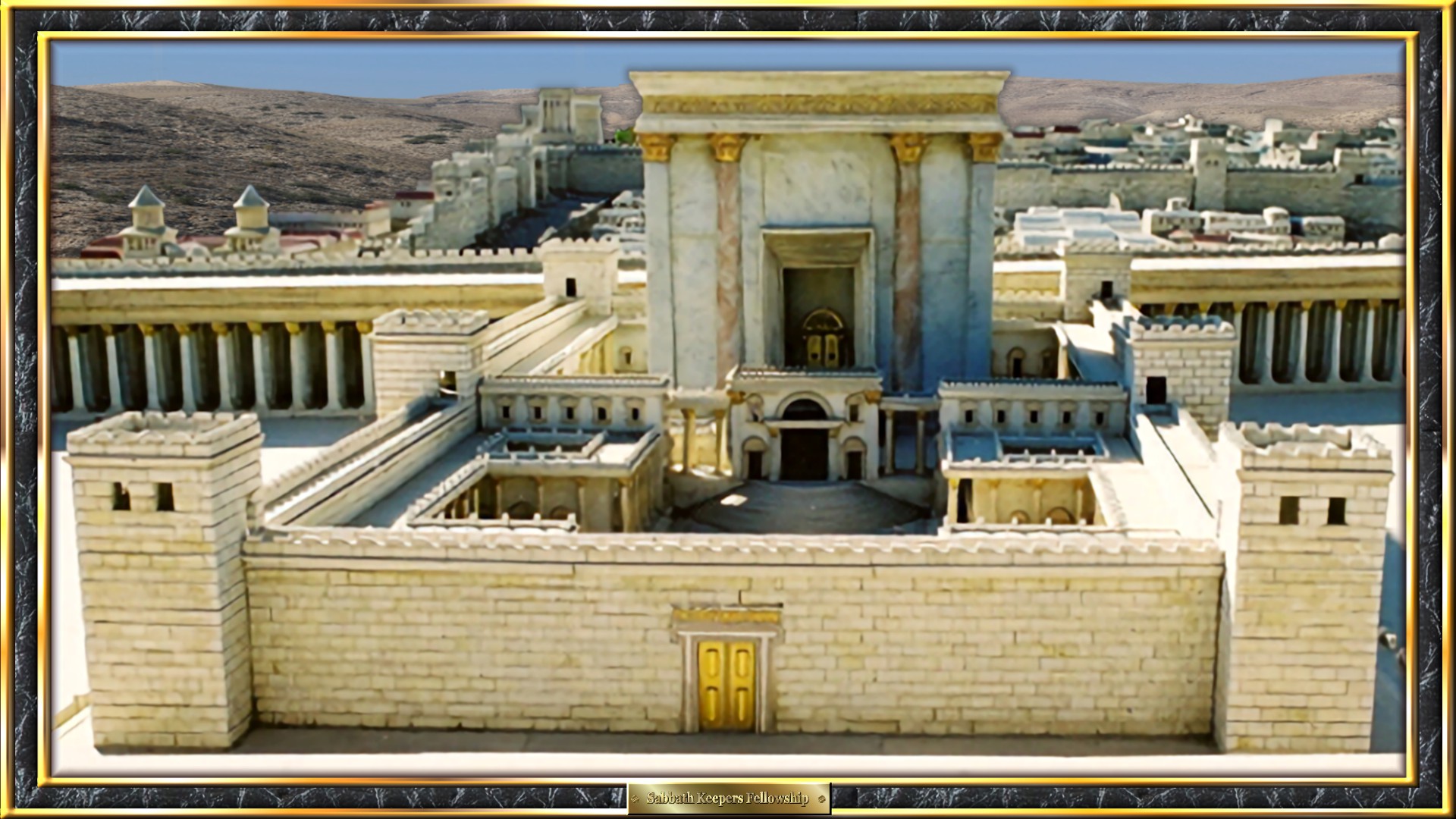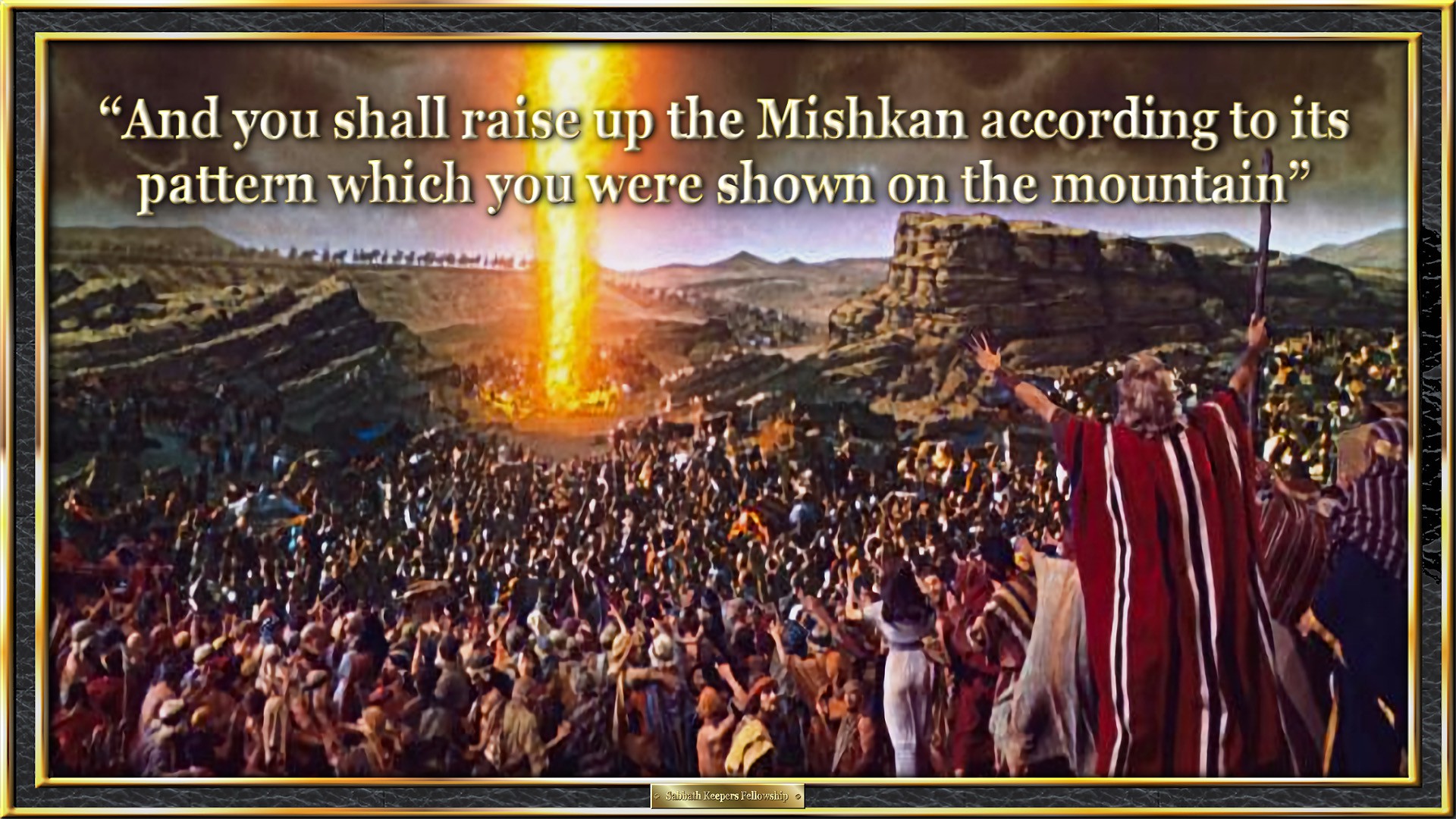Watch
Events
Articles
Market
More
FROM THIS WEEK’S TORAH PORTION – TERUMAH:
Adapted from an article by the Temple Institute
Even before “In the beginning...” Elohim’s intention was for His presence to dwell within creation and to bless creation with His excellence. For this reason, Elohim placed man – Adam – the crown of Elohim’s creation within the Garden of Eden to dwell in intimate proximity to YHWH. And there the story would have ended, but for Adam’s defiance of Elohim’s single stipulation. So when Elohim asked Adam, “Have you eaten from the tree of which I commanded you not to eat?” and Adam refused to accept responsibility for his actions and cast the blame on Elohim, saying “The woman whom You gave to be with me she gave me of the tree; so I ate,” and it became clear to YHWH that this arrangement could not endure, He cast Adam and Eve from the garden. And thus begins what we call history. Man carried on in a world of “thorns and thistles” and Elohim, His plan for creation confounded by the wild card called man, had to find a new approach to His beloved creation. So, Elohim waited patiently for man, endowed with the freewill first exercised by Adam, to willingly turn his heart to YHWH. And this, of course, is the story of Avraham, who Elohim refers to as “Avraham, My beloved.” But Avraham, as we know, was just the beginning of the story of man’s return to YHWH and YHWH’s endeavor to renew His presence in creation.
This is the backstory behind YHWH’s forty-day private meeting with Moshe atop Mount Sinai. Having brought Israel out of Egypt and blessed her with Torah, opening with the Ten Commandments and continuing with the rules and regulations designed to enable the formation of a just and loving society, the time has come for Elohim to share with Moshe his chief desire: to dwell amongst His people. At last YHWH can unburden Himself to Moshe and relate to him all the details of His age-old dream of an earthly Sanctuary within which His presence can dwell. But YHWH’s great take away from Adam’s primordial rejection of Elohim’s will, was that this time, the initiative, the desire, the longing and the hands-on effort to bring YHWH back into our lives must come from man. And so, Elohim opens His discourse with Moshe, saying,
“Speak to the children of Israel, and have them take for Me an offering; from every person whose heart inspires him to generosity, you shall take My offering. And this is the offering that you shall take from them: gold, silver, and copper; blue, purple, and crimson wool; linen and goat hair; ram skins dyed red, tachash skins, and acacia wood; oil for lighting, spices for the anointing oil and for the incense; shoham stones and filling stones for the ephod and for the choshen. And they shall make Me a sanctuary and I will dwell in their midst.”
YHWH knows that His long deferred dream can only be realized if man’s heart desires it. It’s no longer enough that YHWH wants to be with His children. His children must want to be with Him. The only way to let YHWH into our hearts is to open our hearts with generosity, to create a space for Elohim to fill. And just as individuals must possess a heart inspired to generosity to let Elohim in, so must a nation redeemed by YHWH, and told that it will be a “kingdom of kohanim and a holy nation,”possess a heart and a place for YHWH to fill with His presence. YHWH is calling on us to be His partner in perfecting creation. YHWH wants a dwelling place within our midst, to be our neighbor, to be part of our lives, not just as individuals, but as a people, and, ultimately, as a family of nations. This is what Elohim is telling Moshe on top of Mount Sinai.
Building a Sanctuary for YHWH, a Tabernacle in the wilderness, and a Holy Temple in Jerusalem is nothing less than an act reclaiming responsibility for our own actions in Elohim’s creation. It was Adam’s refusal to accept the responsibility for eating from the tree of knowledge that first caused the rupture in man’s relationship with YHWH and it is the positive response to Elohim’s call for “every person whose heart inspires him to generosity” by which we reclaim our responsibility, not only to ourselves, but to Elohim.
Elohim is not commanding us to possess generous hearts, nor is he compelling us to build for Him a Sanctuary. Neither love nor generosity can be commanded. But only love and a spirit of generosity, of sharing our existence with Elohim, and of giving of ourselves to make it happen, can build a house for YHWH so that He may dwell amongst us. YHWH is appealing to man to lift ourselves up, (the root meaning of the Hebrew word “terumah” (offering), to make our highest aspirations YHWH’s highest aspirations, and He is telling us that He can’t do it alone! Only we, frail mortals that we may be, can roll up our sleeves, wipe the sweat from our brow and build a physical house of wood and stone and silver and gold for YHWH to fill with His supernal presence.
This is the place that the world will stream to at the end of days, to bask as one in the presence of Elohim’s love and blessing. This relationship, that Elohim first forged with Avraham, His beloved, is what Elohim desires for all mankind. We will soon discover that the children of Israel in the wilderness were up to task, and together with one heart swiftly and lovingly build the Tabernacle in perfect accord to YHWH’s desires. Are we up to the task today? Can we set aside our petty differences and open our hearts to one another and to YHWH? Are we willing to give of ourselves and of the gifts that Elohim has blessed us with in order to create a place on earth where all Elohim’s children can share our humanity and open our hearts to YHWH’s blessings? It’s truly all that Elohim is asking of us.




FROM THIS WEEK’S TORAH PORTION – TERUMAH:
“And YHWH spoke to Moshe, saying, ‘Speak to the children of Yisra’el, that they take up a contribution (Terumah) for Me. From everyone whose heart moves him you shall take up My contribution. And this is the contribution which you take up from them: gold, and silver, and bronze, and blue and purple and scarlet material, and fine linen, and goats’ hair, and rams’ skins dyed red, and fine leather, and acacia wood, oil for the light, spices for the anointing oil and for the sweet incense, shoham stones, and stones to be set in the shoulder garment and in the breastplate. And they shall make Me a Set-apart Place, and I shall dwell within them. According to all that I show you – the pattern of the Dwelling Place and the pattern of all its furnishings – make it exactly so.’”
The words Shakanti B’tokam (שָׁכַנְתִּ֖י בְּתוֹכָֽם), from the beginning of this week’s Torah portion, are usually translated “I shall dwell in their midst,” or “I shall dwell among them.” However, these are not the only translations possible.
The compound word Shakanticertainly means “I dwell,” and indicates a residing physical/spiritual presence. However, the word B’tokam can have somewhat different shades of meaning. Its root is the Hebrew word tok (תוך), which is sometimes translated “among,” but more often is translated as “in,” or “within.” It can even be translated as “inside.” Thus, the highlighted verse above can fairly be translated as, “And they shall make Me a Set-apart Place, and I shall dwell within them” – or “inside them.”
Consider that. It is a commandment of the Most-High that the people of Yisrael are to make for Him a set-apart Dwelling Place B’tokam – within them.




Just a thought to sleep on:
Films and programs on TV do not only cost you a license and monthly subscription, but it costs you your time as well. Social media does not only cost you to pay the Internet, but it also costs you your focus. Fast food not only costs you your money but also your health. There are always in everything a hidden cost. Thus, invest in the things that does not have a hidden agenda -- prayer, the Word of YHVH, and in worship.


